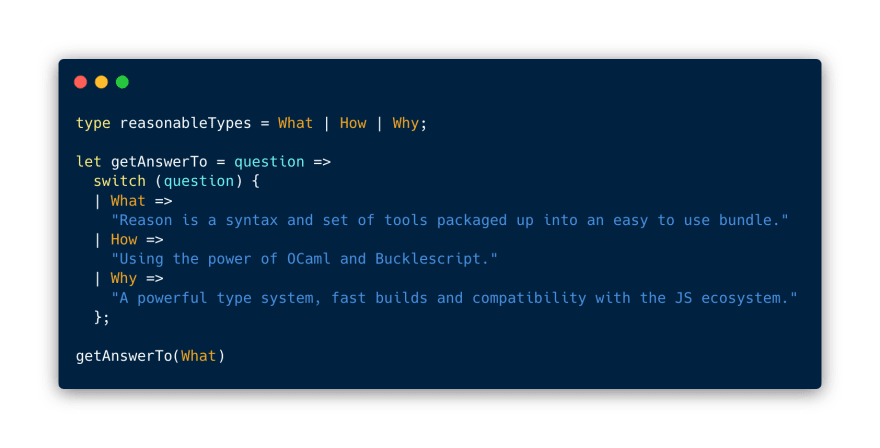A new language for the web from Facebook that compiles to JavaScript
Reason (previously ReasonML), is a syntax and set of tools packaged up into an easy to use bundle. Its aim is to appeal towards JavaScript engineers by providing a familiar syntax and making it easy to integrate into the existing JS ecosystem. I’ve been watching it develop over the past year and experimenting with it on the side. So what is Reason and why should you care about it?
Reason’s goal is to make a less well known language, OCaml, more familiar and easily integrated into the existing JavaScript ecosystem. It’s designed to play nicely with the work-flows you’re used to and the tools you know. On the surface it’s a new syntax on top of OCaml which looks a bit more like JavaScript (In fact, you can probably copy some JS into a reason file and it will work).
The key benefit for web developers is that Reason uses BuckleScript to compile to JavaScript. Reason boasts a powerful type system too. If you’re already using static type checking then you will know why it makes refactoring much smoother and gives you more confidence that the code you write is correct and won’t throw up runtime errors in production.
Why use Reason over TypeScript or Flow?
If you aren’t using a static type checker, I’m interested in why? Otherwise, if you’re already bought into the idea of static typing for JavaScript then you might wonder why you’d want to go through the process using another language entirely. Unlike TypeScript and Flow, Reason makes use of type inference so you rarely have to explicitly tell the compiler what the types are. It’s a frequent pain point I have with Flow and TypeScript on a daily basis that Reason solves. This saves a lot of time and effort compared with other static type checkers, Reason can infer the types and still give you the confidence you need.
But, Reason is compiled — won’t it be slow?
If you use tools like babel to transpile your source code to ES2015 today, you’re already performing something similar to compilation. It’s usually one of the many steps your source code goes through before reaching the end-user. If you’re not, then moving to a compiled language is a valid concern. To put your concerns at ease. Reason is very fast. I use a lot of tooling to create modern React applications including webpack, babel and flow. It can take a minute from a cold start and a few seconds whenever a change is made. It didn’t seem like that long but then I used Reason which builds in milliseconds. I wish all compiled languages were this fast, I’m amazed by the performance and it hasn’t posed a problem yet.
Debugging will be a nightmare right?
I use flow for static type checking on a daily basis and the tooling means that debugging is still very easy through modern devtools. Reason is no different, intermediary JavaScript files are created alongside your source by BuckleScript. The resulting code isn’t minified or obfuscated, in fact it looks pretty close to JavaScript code you might write yourself. The benefit of this is that you can follow what the compiler is doing and it acts a great mapping when debugging code.
Can I still use React with Reason?
ReasonReact is a library which allows you to use React in Reason. As far as other libraries are concerned, you can find Reason packages on NPM. Redex (Reason Package Index) exists to collate reason packages and make them easier to find. If the library you want isn’t there then the interop between Reason and JavaScript is relatively straightforward. The hardest thing you have to do is to write the binding between the package in JavaScript and Reason. It involves explicit typing to tell Reason what it’s working with and what types are expected. This can be challenging if the library you want uses a lot of dynamic types or is relatively undocumented.
My journey with Reason is just beginning but I’m excited to see it develop over the coming months and years. It’s a cool language to experiment and I’ve only scratched the surface. Reason has some great features that it make it fun to use but the real benefits lie in the effortless type checking and dedication to creating an experience that’s approachable for existing JavaScript developers.
If you want to give it a go then take a look at the official site. I’ve also created a quickstart for Reason on Learn X in Y Minutes.




Latest comments (2)
Thanks for sharing your thoughts, Seth!
How do you find interop with JavaScript libraries?
As someone with zero knowledge of typed languages, I find it hard to understand how to interact with JS, especially if there aren't existing bucklescript bindings.
How are your experiences?
Interoperability can be very challenging depending on the how dynamic the target API is. It’s common to write functions in JS that accept an array or a single value, null or undefined which complicate interop.
What I like about Reason is that there are layers of interop, the one I showed is the most crude. It’s useful for getting something done quickly. The second level is actually writing bindings.
One huge help I would say is if the target JS library is actually written with TypeScript or flow already, it makes it much easier to write bindings or even make a binding which is more functional than the original.